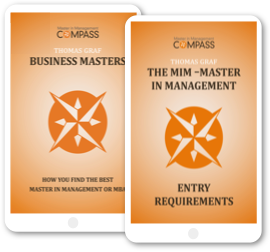The Master in Management (MIM) refers to a special type of postgraduate program that provides general management knowledge for graduates or recent graduates with only little work experience. Masters in Management usually grant a Master of Science or a Master of Arts. Media such as the Financial Times rank such programs, even if the programs themselves are named differently.
- Search for Masters in Management (MIM): More than 600 MIM programs in our database
- Search for Masters of Business Administration (MBA): More than 2,000 MBA programs in our database
Where does the abbreviation "MIM" come from?
The abbreviation "MIM" does not represent an official degree such as an MBA or MSc. However, it is increasingly being disseminated by business schools who abbreviate their Masters in Management with "MIM" (compare, for instance, the CEMS MIM).
Are there MIM-programs that require work experience?
Very few programs indeed are named "Master in Management" or similar (but not MBA) and actually do require work experience. We have included these programs in our database using "Masters in General Management (MIM) for Professionals" as category. Some of these programs require only several months (e.g., the IPBS MSc in International Management), some require a few years, and some even many years (e.g., the Stanford Sloan Master's program) of professional experience.
What's the goal of an MIM? Why should someone choose this type of program?
MIM programs should help university graduates with little or no work experience find a management job fast and easily. At least, that is the objective of business schools that offer MIM programs. However, what is special about this degree and how does it differ from an MBA program?
Europe as precursor for the MIM
The on average 18-month-long MIM programs (Source: Global MIM Survey) want to prepare their students for leading positions in business organizations. The MIM is mainly offered in Europe, but also in Asia, Australia, and Canada. In the US, the Master in Management is just emerging - in contrast to the MBA, which is the most established postgraduate management education in North America.
How to identify an MIM program?
Not all business schools use the name "MSc in Management". Because of different University traditions, marketing strategies or different curriculum and course designs, there are many different names. Even in the Financial Times Ranking for MIM programs, names such as "MSc in International Business" or "Master in Business and Economics" appear. Other variations are "MSc of Management", "MSc in General Management", "MSc in International Management", or "MMS Masters of Management studies". Here are some characteristics of this type of program:
The curriculum: general management overview instead of in-depth knowledge
MIM programs are postgraduate programs in general management. They are not the same as the MSc in Marketing, Project Management, Human Resources Management, IT Management, or Innovation Management programs. Instead, an MIM course portfolio covers a broad range of business topics including some of the aforementioned. Similar to the MBA, it operates on the assumption that a manager can carry out his or her function better if he or she has an eye for the big picture and can at least participate in conversations about relevant management topics. Therefore, the best way to find out whether a program really offers the required management degree, is to go through the selected program with a fine-tooth comb.
Diversity increases your learning effect
MIM programs are usually internationally oriented. MIM students comprise many nationalities and the language used for teaching is English in most cases. You can use our Search Engine Filter to search for MIM programs by the languages in which they are taught.
Learning how to lead and ensure your team follows you
MIM programs should help develop leadership skills. At least many business schools aim to do that and you can find MIM curriculums containing personal development and leadership courses or seminars. Business schools also use case studies and teamwork to try and increase your leadership skills: Case studies give you insights into how a person in a leadership position would solve certain management problems, while teamwork, especially in various teams, challenges your interpersonal skills.
Qualification
An MSc in Management should qualify you to work as a manager. Besides the knowledge, leadership skills, and international experience, you should have the opportunity to apply what you have learnt in a real-world business environment - for example, through internships or in-company projects that are included in the program and the feedback you get from experienced managers and professors.
Screen the curriculum carefully
If you just look at the name Management Masters, it is not possible to know exactly which curriculum it contains. It can be a Master of Science in Management, or a Master of Arts - it can be a Master in Management, a Master in International Management, Business, or Management Studies. Ultimately, the surest way of finding out is to explore the curriculum and the structure of the program thoroughly. By doing this, you can see whether it is a program in general management or whether it has a certain focus. And you can also see how practice-oriented the program is, for instance, based on embedded internships.
Who are the typical Master of Science in Management students?
 On average, Master of Management students are 24 years old and have 10 months of work experience (Source: Global MIM Survey 2012). The primary entry requirements are a bachelor degree, proof of language skills, sometimes the GMAT or comparable tests, such as the GRE, and academic achievements during the undergraduate degree. About two thirds of the MIM programs worldwide accept graduates from all types of undergraduate programs whereas one third requires a business or economics degree. The two thirds that are not restricted to business or economics graduates can be divided into three groups: One group also targets graduates from a limited number of other disciplines (e.g., engineering or social science disciplines); another group is open to graduates from all disciplines; and final group explicitly targets graduates from disciplines other than business or economics.
On average, Master of Management students are 24 years old and have 10 months of work experience (Source: Global MIM Survey 2012). The primary entry requirements are a bachelor degree, proof of language skills, sometimes the GMAT or comparable tests, such as the GRE, and academic achievements during the undergraduate degree. About two thirds of the MIM programs worldwide accept graduates from all types of undergraduate programs whereas one third requires a business or economics degree. The two thirds that are not restricted to business or economics graduates can be divided into three groups: One group also targets graduates from a limited number of other disciplines (e.g., engineering or social science disciplines); another group is open to graduates from all disciplines; and final group explicitly targets graduates from disciplines other than business or economics.
- Regional differences: The aforementioned academic requirements are based on a global survey of Management Masters. However, they may differ strongly from country to country. In Germany, for example, the majority of MIM programs require a first degree in a business-related or economics-related area (consecutive masters). In the United Kingdom it is exactly the opposite. The vast majority does not require a first degree in business or economics.
Key links
- The MIM eBook: How you find the right program
- Wikipedia - The Free Encyclopedia - Article on the Master of Management Admissions, Program Structure, Course Topics, the MIM in Europe, Canada, and other countries
- Wikipedia article on MBA
- Wikipedia article on business schools
- Financial Times Rankings
By Thomas Graf









